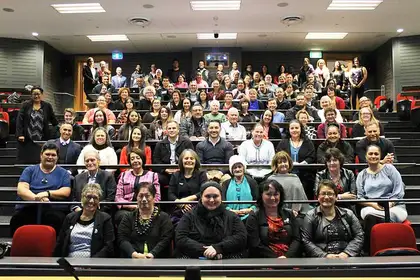
Participants at Te Rau Puawai 20th anniversary hui at Massey's Auckland campus.
With an average pass rate of 95 per cent, Massey University’s Te Rau Puawai programme has achieved phenomenal academic success for its students, but more importantly has had a far reaching impact on Māori mental health services in New Zealand.
Since its inception in 1998, almost 400 new graduates have been added to the Māori mental health workforce with many now filling influential roles throughout the sector.
Its success was marked last week with a special event in Auckland to celebrate its 20th year. Minister for Māori Development Nanaia Mahuta praised the thought leadership of Professor Emeritus Sir Mason Durie who developed the programme in response to concerns around the lack of Māori employed within the mental health sector.
Professor Durie told the hui the original concept was simple – to provide scholarships for Māori students to study health qualifications with a goal of 100 graduates over five years, hence the name, Te Rau Puawai (100 blossoms). He recounted how he and fellow academic Taiarahia Black travelled to Christchurch to petition the Health Funding Authority for financial support thinking they would most likely get only five to 10 scholarships. But the Authority offered to fund the entire programme as a workforce development intiative specifically for mental health. The first 100 graduates were delivered within the five year target and the contract has continued ever since with the support of the Ministry of Health - Health Workforce New Zealand.
It quickly became clear that providing scholarships along with active student support, framed within a Māori context was a recipe for success. A small team were tasked with providing academic and pastoral care, including weekly phone calls, hui and visits to students, many of whom studied by distance. The small team now consists of administrative coordinator Robyn Richardson, academic coordinator Byron Perkins, Elaine Duval and a cohort of Satellite Support Mentors who are strategically placed throughout New Zealand.
Professor Durie believes there are four elements that are key to the programme. The first was high expectations. “The students knew that excellence was required and if they got a B+ then there would be a discussion about how to get to an A.” Secondly, whānaungatanga or providing students with a sense of whānau. Professor Durie says regular calls to check on progress and twice yearly hui ensured students felt connected. Thirdly, an understanding of the importance of tikanga or Māori custom provided strong cultural support. Professor Durie says Te Rau Puawai was about more than attaining qualifications. “There was always a sense that this was about more than the individual - it was about the health of our people.”
This year has been monumental for Te Rau Puawai. In March, Massey University recognised the collaboration with the Ministry of Health - Health Workforce New Zealand, by awarding them the 2018 Partnership Excellence Award at the Defining Excellence Awards at Parliament. Not only did this award recognise the successful partnership between the two organisations, but the success and ongoing championship of Te Rau Puawai and its contribution to positive Māori Mental Health in New Zealand.